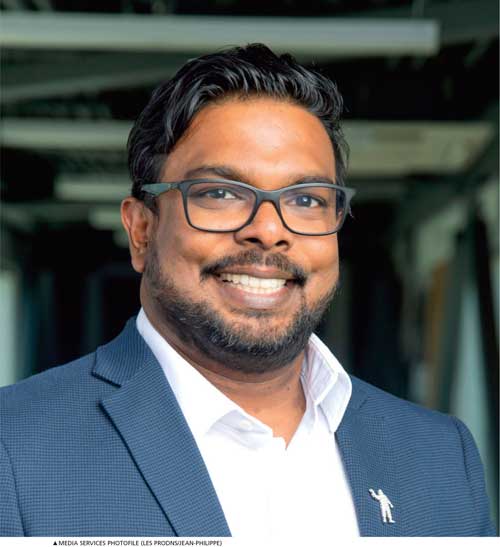Chinthaka Palliyaguru
Leveraging innovation
Sri Lanka’s time zone facilitates round-the-clock productivity

Q: As a Sri Lankan leading a global team at Michelin in Canada, how has your multicultural background influenced your approach to IT leadership?
A: I was born and raised in Colombo, a city renowned for its rich multicultural fabric where people of various ethnicities, religions and traditions coexist. This diversity exposed me to different cultural practices, languages and ways of thinking at an early age.
Growing up amid the vibrant celebrations of Sinhalese and Tamil New Year, Vesak, Eid and Christmas, I developed a deep appreciation for different values and world views. This cultural richness taught me the importance of empathy, respect and active listening, which are essential for leading a global team.
The Sri Lankan culture of hospitality, generosity and community spirit has also influenced my leadership style, encouraging me to foster environments where team members feel valued and included, regardless of their background.
By embracing different perspectives, I am able to navigate cultural nuances and create a collaborative atmosphere that drives creativity and innovation.
This inclusive approach, rooted in my upbringing, enables me to adapt leadership strategies to suit various cultural contexts, ensuring that our global operations are both cohesive and efficient while reflecting the diverse contributions of every team member.
Q: The IT industry is evolving rapidly, especially with emerging technologies like AI and IoT. What role do you see these technologies playing in the next year or two?
A: AI and IoT will drive innovation and digital transformation across industries, impacting automation, data analysis and personalised experiences. This will enable informed decisions, process optimisation and enhanced customer engagement.
We’ll have more intelligent connected devices across industries, leading to real-time monitoring, new services and business models. AI and IoT will create a more interconnected world, posing data security, privacy and scalable infrastructure challenges.
Q: In your experience, how important is IT innovation in driving operational efficiency for global businesses?
A: IT departments have evolved from mere support functions to becoming core components in many organisations.
This transformation is mainly because IT innovations are crucial for driving operational efficiency in global businesses and ensuring adaptable scalable systems that are capable of meeting evolving demands.
To keep my team ahead of the curve, I prioritise fostering a culture of continuous learning and innovation through training, certifications, industry conferences, and collaboration across regions and departments.
Experimentation with new tools and methods is critical to driving business operational excellence.
Q: Having worked in various sectors and geographies, what do you think are the key challenges and opportunities for IT leaders in today’s global village?
A: In our modern interconnected world, we encounter a range of distinctive challenges and promising opportunities.
Our main challenges include cybersecurity threats, rapid technological change and the need to comply with regulations.
However, we also have the potential to leverage digital transformation, a global workforce and cloud computing, as opportunities to address and overcome these challenges.
Q: ERP migration and integration are complex undertakings. What are the critical success factors for such transformations – especially in large organisations such as Michelin?
A: When handling complex projects like this, I prioritise the human aspect and have two critical success factors.
The first is engaging with stakeholders: involving stakeholders from different departments early ensures that the project meets its goals. This will foster support, minimise resistance and encourage user adoption, which is crucial for success.
And second is managing change: implementing a solid change management strategy is essential for addressing the cultural shift of ERP changes. Proper training, communication and support help employees adapt to new systems and processes.
Q: And do you see any potential for collaboration between Canadian and Sri Lankan IT professionals?
A: I see great potential for collaboration.
Sri Lanka has a strong pool of skilled IT professionals, particularly in software development, data analytics and emerging technologies. Collaborating with Sri Lankan IT professionals can provide Canadian companies with cost-effective solutions without compromising quality.
Moreover, Sri Lanka’s time zone facilitates round-the-clock productivity when paired with Canadian teams, leading to faster project completion and enhanced global responsiveness.
Q: Do you feel that the global tech community is becoming more inclusive – and how can organisations foster diversity and inclusion in tech leadership?
A: Yes, the global tech community is becoming more inclusive. Many organisations recognise the value of diversity, equity and inclusion (DEI), as a driver of innovation and business success.
Commitment from senior leadership, hiring practices that actively seek diverse talent, open communication channels and regular DEI training can help establish practices in the industry, and drive success in a diverse global market.

CV IN A NUTSHELL
Chinthaka Palliyaguru is a dedicated father and husband, with a passionfor IT and people development. His journey began as the co-founder of an IT startup in Sri Lanka. Since then, he’s been committed to leveraging cutting-edge technologies and best practices to drive meaningful change.
With over 15 years’ success in theIT industry, he is known for his ability to navigate complex challenges and deliver impactful solutions. Palliyaguru’s international experience across Canada, the US, Sri Lanka, Vietnam, the UK and Belgium has sharpened his adaptability, and nurtured a global perspective.
FACT FILE
FAMILY
Wife – Maleesha
Son – Darshith
Daughter – Menukya
SCHOOLING
Nalanda College
HIGHER EDUCATION
BSc – University of Westminster
MBA – Postgraduate Institute of Management (PIM)
PRESENT OCCUPATION
IT Director
COUNTRY OF RESIDENCE
Canada
CITY OF RESIDENCE
Sherbrooke
